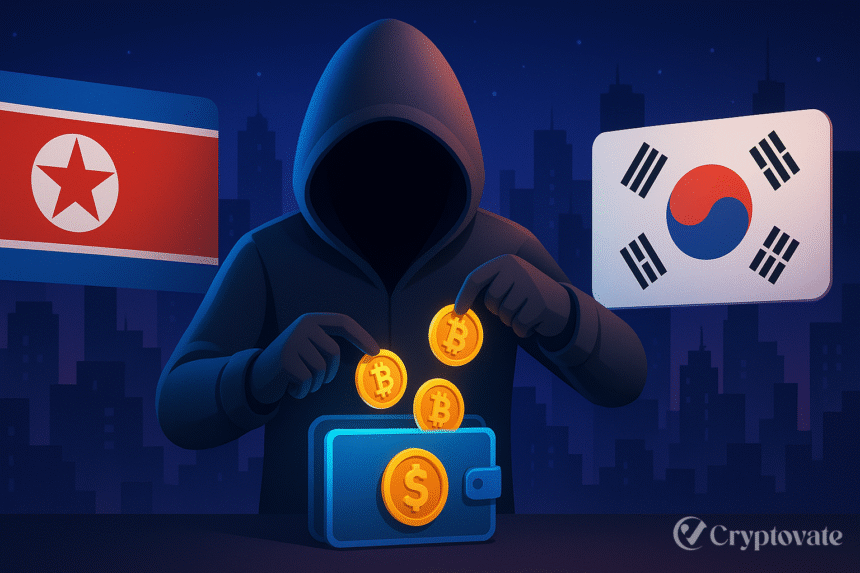– Ad –
| Getting your Trinity Audio player ready... |
In a chilling revelation, South Korea’s Internet & Security Agency (KISA) has exposed how North Korean hackers are leveraging artificial intelligence, specifically tools like ChatGPT, to orchestrate sophisticated cryptocurrency thefts. This emerging cyber threat highlights the growing intersection of AI and cybercrime, raising alarms for crypto investors and cybersecurity experts worldwide. As North Korea’s hacking groups, such as Kimsuky and Andariel, adopt AI-driven tactics, the crypto community faces unprecedented risks. Here’s a closer look at how these hackers operate, what South Korea’s findings mean, and how you can protect your digital assets.
North Korea’s AI-Powered Crypto Heists
According to a June 2025 report by KISA, North Korean hackers have integrated AI tools like ChatGPT to automate and scale their cryptocurrency theft operations. During a security conference in Seoul, lead researcher Lee Seul-gi detailed findings from an investigation of 39 virtual server images seized in September 2024. These servers revealed that groups like Kimsuky and Andariel are using AI-generated scripts to execute automated crypto transfers. Specifically, the scripts are designed to siphon funds from victims’ wallets when their balance exceeds $200, streamlining the theft process with chilling efficiency.
The hackers reportedly infiltrated a South Korean cryptocurrency community with nearly a million members, harvesting usernames and email addresses for targeted phishing campaigns. By using ChatGPT to craft convincing phishing emails and malicious code, these groups bypass traditional security measures, making their attacks harder to detect. While it’s unclear if the AI-generated scripts required manual refinement, the use of AI marks a significant leap in North Korea’s cyber capabilities.
Why AI Makes These Attacks So Dangerous
AI tools like ChatGPT enable hackers to automate complex tasks, from writing phishing emails to generating malicious scripts, at an unprecedented scale. Unlike traditional hacking methods that rely on manual coding or social engineering, AI-driven attacks can operate continuously, targeting multiple victims simultaneously. This automation reduces the time and expertise needed, allowing even less-skilled operatives to execute sophisticated attacks.
Moreover, AI-generated content often appears more polished and convincing, increasing the success rate of phishing attempts. For instance, ChatGPT can produce natural-sounding emails that trick users into revealing wallet credentials or clicking malicious links. The KISA report underscores that North Korea’s adoption of AI is part of a broader strategy to fund illicit activities, including weapons programs, through cryptocurrency theft, which has reportedly netted billions in recent years.
Also Read: BitMEX Outsmarts Lazarus Group: How a Crypto Exchange Exposed North Korean Hackers
South Korea’s Response and Global Implications
South Korea, a global hub for cryptocurrency innovation, is on high alert. KISA’s findings have prompted calls for stronger cybersecurity measures in the crypto sector. The agency is collaborating with international partners to track and disrupt North Korean hacking networks. OpenAI, the creator of ChatGPT, has also taken action, banning accounts linked to North Korean operatives in early June 2025 after detecting misuse of its platform.
Globally, this development raises questions about the ethical use of AI and the need for robust regulations. While North Korea denies involvement in these cyberattacks, the evidence suggests a state-sponsored effort to exploit digital assets. For crypto investors, the threat is a stark reminder to prioritize security in an increasingly AI-driven cyber landscape.
How to Protect Your Cryptocurrency
To safeguard your digital assets from AI-powered threats, consider these steps:
- Use Hardware Wallets: Store your cryptocurrency offline in a hardware wallet to minimize exposure to online attacks.
- Enable Two-Factor Authentication (2FA): Add an extra layer of security to your accounts with 2FA, preferably using authenticator apps.
- Verify Emails Carefully: Be cautious of unsolicited emails or links, even if they appear legitimate, as AI can craft convincing phishing attempts.
- Update Security Software: Keep your antivirus and anti-malware tools updated to detect and block malicious scripts.
Conclusion
The revelation that North Korean hackers are using AI tools like ChatGPT to steal cryptocurrency marks a new frontier in cybercrime. South Korea’s alert highlights the critical need to strengthen cryptocurrency security and regulate AI to curb misuse. By staying informed and adopting robust security practices, investors can protect their assets from these evolving threats. As AI continues to reshape the digital world, vigilance is key to staying one step ahead of cybercriminals.
FAQs
How are North Korean hackers using ChatGPT for crypto theft?
North Korean hackers, like Kimsuky and Andariel, use ChatGPT to generate scripts that automate cryptocurrency transfers from victims’ wallets when balances exceed $200. They also craft phishing emails to steal credentials.
What did South Korea’s KISA find in their investigation?
KISA’s investigation of 39 seized server images revealed that North Korean hackers used AI tools to automate crypto theft and infiltrate a South Korean crypto community with nearly a million members.
How can I protect my cryptocurrency from AI-driven attacks?
Use hardware wallets, enable 2FA, verify emails cautiously, and keep security software updated to protect against phishing and malicious scripts.
Is AI like ChatGPT regulated to prevent cybercrime?
Currently, AI tools lack strict global regulations, but companies like OpenAI are banning accounts linked to malicious activities. Stronger oversight is needed to curb misuse.

















